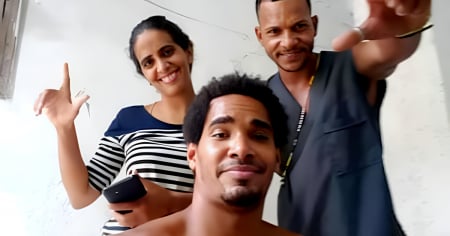The Cuban political prisoners Saylí Navarro and Sissi Abasca continue to face harsh prison conditions following the recent denial by the Cuban regime to grant them extrapenal benefits that would allow them to serve their sentences in a less severe environment.
According to Annia Zamora, Abascal's mother, during the visit made on Wednesday, January 22, she was informed that her daughter, along with Navarro, had been taken to the prison administration the day before, where they were officially notified of the decision to deny them any prison benefits.
"A Saylí was denied her benefit of a less severe regime for six more months. She will have to remain behind bars under a strict regime, just like last September," Zamora explained to Martí Noticias.
In Abascal's case, any reduction of his sentence was denied, keeping him in the status of "negative prisoner" within the facility. "They are only providing them water at night, nothing more, so they have to bathe with dirty, icy water," his mother reported, also raising concerns about the inhumane conditions of detention, which include cold, hunger, and extreme restrictions.
Félix Navarro, father of Saylí and one of the recently released political prisoners, described the situation as "criminal" and denounced the systematic repression against both activists.
"From the beginning, they have been suppressed, restricted in their phone calls, always under the supervision of high-ranking officials," declared Navarro, who announced future protest actions to demand the release of political prisoners from July 11. "We will raise our voices again in defense of our brothers," he stated.
Saylí Navarro was sentenced to 8 years in prison for the crimes of assault and public disorder, while Sissi Abascal received a sentence of 6 years of deprivation of liberty for the crimes of contempt, assault, and public disorder.
Both were arrested for their participation in the protests on July 11, 2021, where they demanded democratic changes and the release of political prisoners in Cuba.
A context of hardening and repression
The Cuban regime's refusal to grant prison benefits occurs in a context of increased repressive measures against political prisoners.
In recent days, the process of releasing prisoners agreed upon with the Vatican has been halted after the administration of President Donald Trump once again placed Cuba on the list of state sponsors of terrorism in January 2021.
This decision halted the release of political prisoners, despite the Cuban regime insisting that it was not linked to the Biden administration's decision to remove Cuba from the aforementioned list, a claim denied by non-governmental organizations and the Cuban civil society, who demand that the agreed-upon terms be honored and that all political prisoners of the regime be released.
According to reports from human rights organizations, the tightening of the prison regime affects not only Navarro and Abascal but also dozens of other prisoners from July 11, 2021, who have been subjected to extreme conditions, prolonged isolation, and severe restrictions on their communications with the outside world.
Navarro and Abascal were condemned for their participation in the peaceful protests on July 11th, where thousands of Cubans took to the streets to demand freedom and better living conditions. Since their incarceration, both have reported mistreatment, lack of medical attention, and deprivation of basic rights within the prison.
The situation has generated growing concern at the international level. The European Parliament, organizations such as Amnesty International and Human Rights Watch, and governments like that of the United States have repeatedly demanded the release of Cuban political prisoners, labeling their sentences as arbitrary and politically motivated.
Meanwhile, the families of both political prisoners continue to demand justice and freedom for their daughters, stating that they will not stop their efforts until they are released and can be reunited with their loved ones. "We cannot remain silent; we must keep denouncing these injustices," concluded Félix Navarro.
Filed under:
